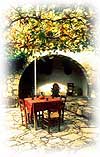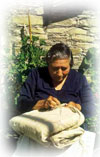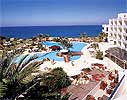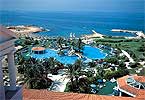|
|
 Have you
ever been to Cyprus?
Did you know that Cyprus is not only a Top Tourist Destination, but also
a top level sports training destination? Have you
ever been to Cyprus?
Did you know that Cyprus is not only a Top Tourist Destination, but also
a top level sports training destination?
If you have
been to Cyprus before,
we know you keep
coming
back anyway. If not, don’t miss out the chance to visit our beautiful
Mediterranean island with Amazon
Sports
Services.
The
geographical position of Cyprus in the Mediterranean Sea, its history of
more than 9000 years, its golden sandy beaches, its luxurious
vegetation, its timeless picturesque villages in striking contrast to
modern cosmopolitan towns and its friendly warm hearted inhabitants are
the secret charms of Cyprus that contribute to making your stay a
wonderful and unforgettable experience.
|
|
|
GENERAL INFORMATION ABOUT
CYPRUS
Cyprus
lies in the Northeast corner of the
Eastern Mediterranean
and marks the cross roads between Europe, Asia and Africa. It is the
third largest island in the
Mediterranean
with an area of 9,251 square kilometres. It is an island of
contrasts. A young republic, yet with a history stretching back
thousands of years. It
is
said that Aphrodite, the Goddess of Beauty and Love was born here
(the first picture above is Aphrodite's birth place)
Cyprus
is the warmest island in the
Mediterranean with an unbroken sunshine of 340 days a year. The four
seasons are clearly defined and winter temperatures range between
4-13
°C
while in the summer temperatures are around 21-39°
C. Spring and Autumn are characteristically mild and sunny with
temperatures around 15-20
°C.
It usually rains between November and March. There is snowfall on
the Troodos Mountains during January and you can ski until March.
A 20 minute
car-ride
from Troodos Mountains you can enjoy the Sun
and the Sea
even during the winter period.
Hospitality is our trademark:
The people of Cyprus are warm, friendly and naturally
hospitable, and it is a genuine pleasure for us to welcome visitors
- perhaps because they have been doing just that for thousands of
years.
Geographical Crossroads: As the third largest island in the
Mediterranean, with its unique proximity to Europe, Asia and Africa,
Cyprus has been coveted, won and lost by countless civilizations
over the centuries.
3000 years of History and Civilization: Since the Mycenean
Greeks settled here over 3,000 years ago establishing the Greek
civilization on the island, we have seen Phoenicians, Romans,
Crusaders, Franks, Venetians and other conquerors who have all left
their mark here and helped to shape the island's special character.
Aphrodite, mythological goddess of beauty and love, was born in the
foam of our warm seas, and spawned a huge cult in pagan times. Yet
on those same shores St. Paul himself was to introduce Christianity
to Cyprus - by converting the first ever Roman Governor - in 45 AD.
Island of beauty and variety: Cyprus is an island of great
beauty and endless variety. Golden beaches and rugged coastline are
contrasted by the impressive backdrop of unusual mountain ranges.
Greek temples, Roman, remains, Byzantine churches and Crusader
castles, inspire fascinating excursions.
How to get to Cyprus
More
than
40
airlines
including Cyprus Airways operate over 200 scheduled and chartered
flights weekly between the International
Airport of
Larnaka
and Pafos
to most European and Middle East countries. Flying from Athens is
approximately a
1½
hour flight, from London 4 ½ hours, Frankfurt 3 ½ hours and Rome 3
hours. If
you need more information you can find a complete
Travel book here.
|
Flight Time FROM Cyprus TO: |
|
|
- London: 4 hours 30 min. |
- Paris: 3 hours 30 min |
|
- Vienna: 3 hours |
- Zurich: 3 hours |
|
- Frankfurt: 3 hours 30 min |
- Athens: 1 hour 40 min |
|
- Amsterdam: 3 hours 30 min |
- Stockholm: 5 hours |
|
- Bahrain: 3 hours |
|
|
|
|
|
Food and Wine of Cyprus
Cyprus
cuisine is closely related to that of
Greece,
but the island’s unique position at the crossroads of
Europe, Africa, and the
Middle East has added exotic dimensions that make it particularly varied
and delicious. Emphasizing fresh local ingredients, regional herbs
and spices, and the light use of natural olive oil, the Cypriot
palate is quintessentially Mediterranean in character.
If freshness (see
markets, below) is one key to cooking in Cyprus, meze is the other.
An abbreviation of mezedes, or “little delicacies,” meze consist of
as many as 30 small plates of food, from savory dips and vegetables
to a wide range of fish and meat dishes. Much more than hors
d’oeuvres, the meze often comprise the heart of a meal itself. In
some restaurants and tavernas you can choose to order seafood meze
or meat meze.
Among the items you
can expect to be served are: Loukanika, coriander-seasoned sausages,
soaked in red wine and smoked; Koupepia, grape leaves stuffed with
minced meat and rice; Lountza, smoked pork, often served in
sandwiches with halloumi, a delicious soft cheese, (usually grilled)
made from thyme-fed sheep and sometimes spiced with peppermint;
sheftalia, grilled pork sausage, afelia, pork marinated in wine and
coriander; stiphado, beef or rabbit stew casseroled with wine
vinegar, onions and spices; and ofto kleftiko, chunks of lamb cooked
in a sealed clay oven and seasoned with bay leaves.
Seafood dishes
include calamari, octopus in red wine, barbouni (red mullet), and
sea bass. Some common vegetable preparations are potatoes in olive
oil and parsley, pickled cauliflower and beets, zucchini, kolokasi
(a sweet potato-like root vegetable) and asparagus.
There are also the
Greek classics taramosalata, fish roe blended into a creamy pink dip
of pureed potatoes with parsley, lemon juice and finely chopped
onion; talatouri, cool mint and cucumber flavored yogurt with a
dusting of garlic, a variation on the Greek tzatziki;
Greek salad (horiatiki
salata) with tomatoes, lettuce, bell peppers, feta cheese, green
olives and local herbs; moussaka, the traditional Greek dish of
minced meat and eggplant topped with creamy bechamel sauce; and
souvlakia, kebabs of pork, lamb and chicken.
Cypriot desserts
often consist of fresh fruit, served alone or with a selection of
sweet pastries or fruit preserved in syrup. These include
loukoumades, Cyprus doughnuts with honey syrup, daktyla, ladyfingers
with almonds, walnuts and cinnamon, and shiamali, orange semolina
cakes cut into squares. In cafes, popular snacks include kolokoti, a
pastry triangle stuffed with red pumpkin, cracked wheat and raisins,
and pastellaki, a sesame, peanut and honey syrup bar. There is also
galatopoureko, a cream-stuffed phyllo pastry. A traditional sweet
treat is loukoumia, cubes of gelatin flavored with rose water and
dusted with powdered sugar.
Food Related Links:
Food Guide
-
Cyprus Cookbook & Recipes |
|
back to top |
|
|
|
Accommodation
 A diverse range of
accommodation awaits visitors to Cyprus, from cozy
agrotourism villas in the hill towns to three, four and five
star hotel resorts. At hotels visitors will generally find modern,
up to date common areas, contemporary room furnishings and a high
level of service unique to the Mediterranean region. Most
international hotels (three or more stars) have at least one
swimming pool and usually at least one restaurant. Buffet style
dining is popular and presents diners with a bountiful array of
market fresh Cyprus and international cuisine. A diverse range of
accommodation awaits visitors to Cyprus, from cozy
agrotourism villas in the hill towns to three, four and five
star hotel resorts. At hotels visitors will generally find modern,
up to date common areas, contemporary room furnishings and a high
level of service unique to the Mediterranean region. Most
international hotels (three or more stars) have at least one
swimming pool and usually at least one restaurant. Buffet style
dining is popular and presents diners with a bountiful array of
market fresh Cyprus and international cuisine.
Hotel apartments
are popular options among some visitors. They are ideal for longer
stays, for the budget-conscious and for those who value independence
over all else. Rates for hotels and hotel apartments are available
on request.
Click here for a complete hotel and hotel apartment directory.
Cyprus
offers a wide variety of holiday accommodation, ranging from modern,
large and luxurious establishments, to small and simple family run
operations.
Holiday
accommodation includes:
(a) Hotels
(b) Hotel Apartments
(c)
Tourist Villages
(d) Tourist Villas
(e) Camping
sites
(f) Traditional Houses (Hotels, Hotel Apts)
(g) Tourist Apartments
(h) Furnished Apartments
(i) Guest Houses
(j) Youth Hostels
Most Hotels and
Hotel Apartments have swimming pools, tennis courts, sports
facilities, sauna, air conditioning in rooms etc. The rates charged
by these establishments are approved by the Cyprus Tourism
Organization. Most operations offer special off–season discounts on
the accommodation rates, usually during the period from the 16th
November to the 15th March, excluding the fortnight between the 20th
December and 6th January.
Languages:
English is spoken in all hotels; French and German are also widely
spoken.
ACCOMMODATION IN
PRIVATE HOUSES IS NOT AVAILABLE IN CYPRUS
Hotels Guide
The Cyprus Hotel
Guide includes the Hotels and Tourist Establishments officially
registered and classified by the Cyprus Tourism Organization in
accordance with the provisions of the Hotels and Tourist
Establishments Law and Regulations. The Hotels are classified into
classes from 5 to 1 Star, Traditional Hotels, “Hotels without Star”
and “Guest Houses”, as opposed to Luxury, A', B', and C' class of
Tourist Establishments (i.e. Hotel Apartments, Tourist Villas,
Tourist Villages, Traditional Houses and Camping Sites). All the
accommodation establishments are listed by town / area, type,
category and class, and are in alphabetical order. Detailed
information on terms of stay, rates, discounts and facilities
offered by each hotel operation is included in the Guide, a copy of
which can be obtained, free of charge, from any of the Cyprus
Tourism Organization Offices in Cyprus and abroad.
Click here to see a complete Hotel Guide of Cyprus. |
| |
|
back to top |
|
Safety in
Cyprus
Crime in Cyprus is, comparatively, at a
very low level. The Police is always ready to assist anyone who
needs help. In case of emergency, one may telephone 199 or 112 (in
all towns). All policemen speak good English. |
| |
|
Health & Safety /
Inoculations
Medical
care-needs in
Cyprus
are met through:
1. Government
General Hospitals
2. Private Clinics/Hospitals
Government General
Hospitals and Private clinics/hospitals are mostly concentrated in
urban areas, while health centers, sub-centers, and dispensaries
function in the rural areas, providing a network to meet the medical
needs of the whole population.
All Government
General Hospitals as well as some private clinics have Accident and
Emergency Departments for emergency cases.
Medical treatment
and assistance is offered free of charge to international tourists
in case of health emergencies at the Accident and Emergency
Department of Government Hospitals/Institutions. Out-patient and
in-patient treatment is provided against payment of the prescribed
fees. Holiday-makers can also make use of their health insurance,
which covers medical expenses, provided that this insurance covers
the length of their stay on the island.
Almost all brands
of manufactured medicines are available in Cyprus. Local newspapers
list pharmacies which are open during the night and on
weekends/holidays, as well as the names of doctors who are on call
on weekends/holidays.
Most hotels make
arrangements for Medical services for their guests upon request. The
majority of doctors are English speaking.
FOOD SAFETY AND DRINKING WATER QUALITY
In Cyprus the
safety of food and drinking water quality is monitored by the Health
Inspectors of the Medical and Public Services of the Ministry of
Health and the Local Authorities. Food and drinking water are of
high quality, absolutely safe and no food or water-bore diseases
occur.
Water is safe to
drink in
Cyprus,
as water pollution is negligible and every home has fresh running
drinking-water.
All the District
Water Boards are in constant collaboration with the Government
Health Services and the General Laboratory for the prevention of any
toxicological and bacteriological infection of water in Cyprus.
Tap-water in
hotels, restaurants, public premises, etc., is safe to drink.
Cyprus
is also free from dangerous infectious diseases. No vaccination
requirements for any International Traveler.
Climate:
Climatic conditions in
Cyprus
can be termed as excellent from a health point of view. Therefore,
the climate is ideal for holiday travelers throughout the year. |
| |
|
back to top |
|
Telecommunications
Telecommunications
in Cyprus
are provided by the Cyprus Telecommunications Authority (CYTA)
www.cyta.com.cy, which is a Corporate Body responsible for the provision of
telecommunication services both nationally and internationally.
Services provided
include telephony, telefax, data transmission (packet swithing),
mobile telephony (NMT900 and GSM), paging, telex, telegraphy,
maritime, TV transmission / reception, private leased circuits,
audiotex, video conferencing, ISDN, FR/ATM and Internet.
Telephone Service:
Today, a subscriber
can access automatically from Cyprus subscribers in practically
every country in the world through telephone, telefax and telex. For
telephone inquiries regarding subscribers in Cyprus dial 192,
whereas for foreign subscribers, country and trunk codes dial 194.
Public Card phones and Payphones:
Telecard or coin
operated public telephones are installed at various central
locations in all towns and villages, as well as at the International
Airports, Harbours, Marinas and other locations. Telecards of £3, £5
and £10 denominations may be purchased from banks, post offices,
souvenir shops, kiosks and from CYTA’s Customer Service offices in
all towns. Coin operated telephones accept coins of 2, 5, 10 and 20
cent denominations. All public cardphones and payphones may be used
for national and international calls. Dialing instructions,
international codes and charges are posted in all public telephones.
Reduced Telephone Rates:
The Authority
offers reduced telephone rates for trunk and international calls
during off peak hours: Trunk calls (between districts) 20:00–07:00
every day. International calls
22:00–08:00 every day and all day Sunday.
ISDN:
Intergrated Services Digital Network is the new Telecommunications
dial-up medium that offers rapid and error free communication of
voice, data, images and video on a single digital line.
MOBILE TELEPHONY
(GSM 900/1800): Travellers may use their GSM phones while in
Cyprus, provided that a Roaming Agreement has been signed between
CYTA and their service provider. Roaming Agreements have been signed
with 169 service providers from 79 countries worldwide. Updated
information regarding the service may be obtained by calling CYTA’s
Customer Services Department at 132.
CYTANET:
CytaNet is the largest and most experienced Interned Services
Provider in Cyprus and Middle East, providing connections via the
public telephone network (56kbps), the Intergraded Services Digital
network (ISDN), (64 kbps & 128kbps) and leased lines. With a dynamic
portfolio CytaNet is able to satisfy all of its customers needs.
www.cytanet.com.cy
CytaNet for All:
With the
introduction of this service CytaNet is accessible to all. With no
monthly subscription and only 2 cent per minute, it provides fast,
easy and simple connection to the Internet world. All that is needed
is to type at the username field the word “cytanetforall” and at the
phone number field “0992626”. |
| |
|
back to top |
|
Getting Around Cyprus
The best way to
travel around Cyprus is by car. It is possible to rent a modern car
either before your departure or once in Cyprus with a local agency.
Vehicles are available with both manual and automatic transmissions.
As for roads, they are generally well - paved and modern, except for
some mountain areas. The main thing to remember is that in Cyprus,
driving is on the left, as in the United Kingdom. On the motorways,
maximum speed is 100 kilometres per hour. Use of mobile phones at
any time while driving is strictly prohibited, unless a hands-free
equipment is used.
If you don't wish
to drive yourself, communal "service taxis" are another option. They
provide connections between all major towns every half hour. Regular
taxis are reasonably priced and are especially good options for
airport transfers on the first and or last day of your trip. |
| |
|
back to top |
|
Shopping
 Lacework
and embroidery, pottery and woodwork, and jewelry. . . the artistic
heritage of
Cyprus is a reflection of the island’s history and
traditions that have endured for centuries. Most of the raw
materials used in crafts, from copper to silk and cotton, are native
to Cyprus.
The government has actively strived to preserve local craftworks
since 1975, with the establishment of the Cyprus Handicraft Service.
There is a large Cyprus Handicraft Centre in Lefkosia and official
crafts shops as well as folk art museums in Lefkosia, Lemesos,
Larnaka and Pafos. Lacework
and embroidery, pottery and woodwork, and jewelry. . . the artistic
heritage of
Cyprus is a reflection of the island’s history and
traditions that have endured for centuries. Most of the raw
materials used in crafts, from copper to silk and cotton, are native
to Cyprus.
The government has actively strived to preserve local craftworks
since 1975, with the establishment of the Cyprus Handicraft Service.
There is a large Cyprus Handicraft Centre in Lefkosia and official
crafts shops as well as folk art museums in Lefkosia, Lemesos,
Larnaka and Pafos.
Cypriot lacework is
prized for its quality and artistry. The village of Lefkara is
particularly well-known for its embroidery, called Lefkaritika.
Embroidered lace, worked on off-white linen or cotton, makes for
highly decorative tablecloths, curtains, doilies, placemats and
dresser sets. A specialty of Pafos is Pafitika, fabric embroidered
with geometric designs.
Pottery has been
made in Cyprus
continuously for thousands of years. Attractive pots come in all
shapes and sizes. Terra cotta pieces with white decorations, copies
of museum pieces, are popular gifts, as are copper wares,
hand-painted gourds and handmade baskets, and jewelry with motifs
from antiquity.
There are also
several independent crafts stores and workshops in villages such as
Lemba, Omodos and Laneia. Lemba is known for its pottery. In Omodos
and Laneia one may find workshops for glass blown objects and mosaic
making. Contemporary shopping abounds in Lefkosia, Lemesos, Larnaka
and Pafos. |
| |
|
back to top |
|
Government and Regime
Government:
Cyprus
is an independent sovereign Republic with a presidential system of
government. Under the 1960 Constitution, executive power is
exercised by the President of the Republic, elected by universal
suffrage for a five-year term of office. The President exercises
executive power through a Council of Ministers appointed by him.
Ministers may be chosen from outside the House of Representatives.
The Republic of
Cyprus is a member of the United Nations Organisation and U.N.
Agencies. It is also a member of the Council of Europe and is linked
with the European Union through a Customs Union Agreement. On 4
July, 1990, the
Republic of
Cyprus
applied to the EU for full membership. Moreover it is a member of
the Commonwealth and the Non-Aligned Movement and participates in
the Organisation of Security and Cooperation in Europe.
Legislature:
The legislative authority in the Republic is exercised by the House
of Representatives now consisting of eighty members (56 of whom are
to be Greek Cypriots and 24 Turkish Cypriots) elected by universal
suffrage for a five-year term. At the time of its establishment, the
House consisted of 50 members, 35 of whom were to be Greek Cypriots
and 15 Turkish Cypriots. According to the constitution the ratio is
70% Greek Cypriots and 30% Turkish Cypriots. Following the
withdrawal of the Turkish Cypriot members, the House has been
functioning only with the Greek Cypriot members.
Judiciary:
The administration of justice is exercised by the island’s separate
and independent Judiciary. Under the 1960 Constitution and other
legislation in force, the following judicial institutions have been
established: The Supreme Court of the Republic, The Assize Courts,
District Courts, Military Court, Industrial Disputes Court, Rent
Control Courts and Familiy Courts. The Supreme Courts is the final
appellate court in the Republic and the final adjudicator in matters
of constitutional and administrative law.
Political Background:
In July 1974,
Turkey, using as a pretext the criminal coup against President
Makarios, invaded Cyprus in violation of the UN Charter and all
principles governing international relations. As a result 37% of the
island was occupied, 200 000 Greek Cypriots, who were forcibly
expelled from this area, became refugees in their own country and
are still deprived of the right to return to their homes and
properties. In addition, 1 619 Greek Cypriots are still missing. The
blow was heavy. Byzantine churches, monuments and antiquities were
destroyed or looted and many items were smuggled abroad. Sadly, the
island’s cultural heritage that reaches back to the 7th millennium
B.C. and is part of the common heritage of mankind, continues to
this day to be systematically and deliberately destroyed in the
occupied areas.
Moreover, large
numbers of colonist settlers from Turkey have been transplanted
illegally to the occupied part of Cyprus and given properties
usurped from the expelled Greek Cypriots. Turkish settlers are
estimated at about 114,000 at the end of 1997. At the same time
Turkish Cypriots have been emigrating in large numbers, resulting in
diminishing the size of the Turkish Cypriot community in the
occupied part. All this, coupled with a strong military presence in
the occupied areas (estimated at 40 000 Turkish troops) and an
attempt to change the place names of villages and towns into Turkish
ones, is clear evidence that Turkey is turning the occupied part of
Cyprus into a Turkish province.
A series of UN
General Assembly and Security Council resolutions condemned the
invasion of Cyprus and occupation, demanded the return of the
refugees to their homes in safety and the tracing of the missing
persons and called for respect of the human rights of all Cypriots.
Moreover, the European Commission of Human Rights found the
Government of Turkey guilty of gross violations of human rights in
Cyprus during and after the invasion.
In November 1983
Turkey instigated the announcement by the Turkish Cypriot leadership
of “an independent state” in occupied Cyprus. The international
community through UN Security Council Resolutions 541 of 1983 and
550 of 1984 condemned this unilateral declaration by the Turkish
side, declared it both illegal and invalid, and called for the
immediate withdrawal of the declaration. The opinion of the
international community was ignored by Turkey but no other country
has recognized the illegal regime.
Negotiations for
the solution of the Cyprus problem have been going on intermittently
since 1975 under the auspices of the United Nations, but progress
has been obstructed by Turkish intransigence. As the UN Secretary
General stated in a report “the absence of agreement is due
essentially to a lack of political will on the Turkish Cypriot
side”. This attitude of Turkey as well as the continuing violation
of the fundamental human rights of the people of Cyprus have been
condemned by international bodies such as the UN General Assembly,
the European Parliament, the Non-Aligned Movement, the Commonwealth
and the Council of Europe. |
|
back to top |
|
|
|











 Have you
ever been to Cyprus?
Have you
ever been to Cyprus?







 A diverse range of
accommodation awaits visitors to Cyprus, from cozy
A diverse range of
accommodation awaits visitors to Cyprus, from cozy





 Lacework
and embroidery, pottery and woodwork, and jewelry. . . the artistic
heritage of
Lacework
and embroidery, pottery and woodwork, and jewelry. . . the artistic
heritage of